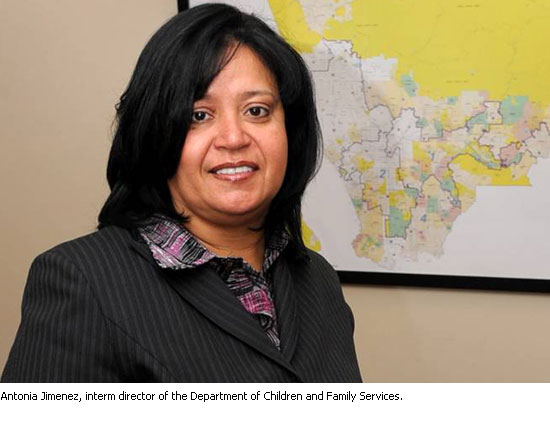She’s got the toughest temp job in town
January 12, 2011
 Three months ago, Antonia Jimenez was the new kid on the block in Los Angeles County’s Chief Executive Office.
Three months ago, Antonia Jimenez was the new kid on the block in Los Angeles County’s Chief Executive Office.
Today, she’s at the helm of one of the county’s most challenged departments, one with a mission second to none: saving kids’ lives.
As the newly appointed interim director of the Department of Children and Family Services, Jimenez has been thrust into a job in which leadership decisions can have enormous real life consequences, with every wrong move getting a very public airing.
Jimenez is just two weeks into the job but already is confronting longstanding trouble spots and dishing out straight talk about what’s wrong—and right—with the department she’s been charged with running since the reassignment of former director Trish Ploehn.
“You have great, great social workers,” Jimenez said in her first in-depth interview since taking the interim director’s job. “I don’t think there’s a lack of talent there. But within that are the mediocre ones who never should have been social workers in the first place.”
Such “problem workers” figured into a review of the department that Jimenez oversaw before assuming her new post. That analysis, released in November, also found: significant backlogs in cases requiring emergency responses; time-consuming and often unfocused mandatory training sessions for administrators, and a welter of “duplicative or contradictory” policies that make it harder for social workers to do their jobs effectively.
Jimenez—who says she’s not permanently pursuing the top job—is realistic about what she can fix as an interim director.
“I’m very honest with the staff. Kids will die, unfortunately…But no kid should die because we haven’t done our job,” she says.
Jimenez, 49, was born in Puerto Rico, grew up in Manhattan and had a two-decade career in Massachusetts state government and several years in the private sector before county CEO William T Fujioka hired her in September as a $215,000-a-year deputy CEO.
As the deputy coordinating and overseeing issues involving children and families, Jimenez didn’t have the luxury of slowly breaking in. She found herself on the front lines of the internal turmoil and public outrage stemming from a series of highly publicized deaths of children who’d had earlier contact with DCFS.
Now that she’s on the inside, she recognizes even more the urgency of getting up to speed.
“You always have a learning curve,” she says. “I have done this little listening tour, and I need to do more.” Doing more includes additional ride-alongs with social workers and observing department hotline and command post operations up close.
One of her top priorities, she says, is to tackle a backlog of emergency cases that have not received action for more than 30 or even 60 days, despite the potential dangers this poses to children. She plans to increase staffing in the seven regional offices with the highest backlogs—particularly in three that account for 50% of the overall total. Jimenez says she’s not only reassigning and transferring employees, but also bringing in “experienced temps” for 120 days “to really focus on this problem.”
In the next few weeks, she’ll also be focusing on the hotline, the first point of contact with the department when a child’s safety is at risk.
She says she will examine staffing levels and the experience of hotline employees, with the aim of making sure that calls that need prompt attention get it and are not placed behind those that can wait a little longer. The goal: “We deal with ‘immediate’ immediately.”
Jimenez, who’s living in Redondo Beach with a friend until she can find the time to get her own place, understands that someone in such a sensitive position must take strong action and cannot simply be a caretaker until a permanent replacement is found. (Read Zev’s blog on what he believes the department needs in a new leader.)
Jimenez acknowledges that the upheaval in the department, culminating with Ploehn’s departure, has been tough on the staff. But it’s also been difficult for her, she says.
“I didn’t come to Los Angeles to remove a director. That wasn’t my job,” she says. “The transition for them, the transition for me, was also hard.”
Posted 1/12/11












 405 bridge work causes a stink
405 bridge work causes a stink

